亨利詹姆斯
亨利-詹姆斯 介绍简介-亨利-詹姆斯 简历-亨利-詹姆斯,名人故事
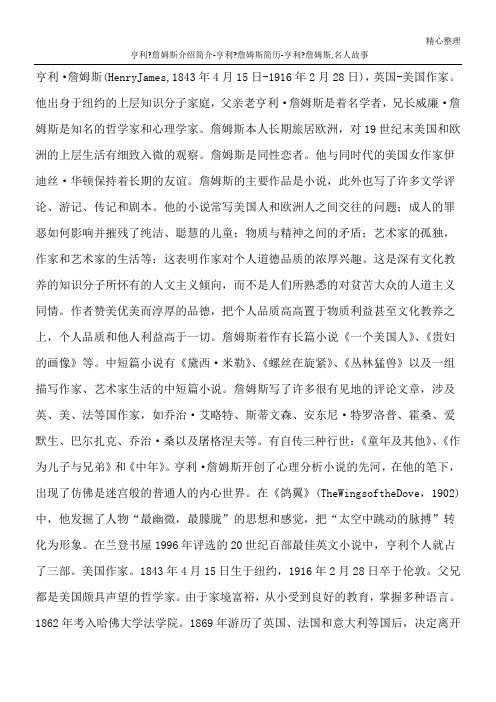
精心整理亨利?詹姆斯介绍简介-亨利?詹姆斯简历-亨利?詹姆斯,名人故事亨利·詹姆斯(HenryJames,1843年4月15日-1916年2月28日),英国-美国作家。
他出身于纽约的上层知识分子家庭,父亲老亨利·詹姆斯是着名学者,兄长威廉·詹姆斯是知名的哲学家和心理学家。
詹姆斯本人长期旅居欧洲,对19世纪末美国和欧洲的上层生活有细致入微的观察。
詹姆斯是同性恋者。
他与同时代的美国女作家伊迪丝·华顿保持着长期的友谊。
詹姆斯的主要作品是小说,此外也写了许多文学评、《作1902)中,他发掘了人物“最幽微,最朦胧”的思想和感觉,把“太空中跳动的脉搏”转化为形象。
在兰登书屋1996年评选的20世纪百部最佳英文小说中,亨利个人就占了三部。
美国作家。
1843年4月15日生于纽约,1916年2月28日卒于伦敦。
父兄都是美国颇具声望的哲学家。
由于家境富裕,从小受到良好的教育,掌握多种语言。
1862年考入哈佛大学法学院。
1869年游历了英国、法国和意大利等国后,决定离开美国,移居欧洲。
1875~1876年住在巴黎,结识了屠格涅夫、左拉、都德等作家。
2年后迁居伦敦。
1904~1905年曾回美国,1915年因不满美国在第一次世界大战初期的“中立”态度而加入英国籍。
詹姆斯从1864年起开始文学创作。
1879年中篇小说《黛西·密勒》使他一举成名。
小说描写美国姑娘黛西·密勒游历欧洲时的遭遇。
她的天真浪漫、热情开朗的性格招来了许多误解和麻烦。
最后客死他乡。
小说将美1881世纪峰。
《使、詹姆斯被誉为西方现代心理分析小说的开拓者。
作品列表RoderickHudson(1875)。
亨利詹姆斯课件ppt

阿斯彭文稿
总结词
以阿斯彭为背景,讲述了一段关于艺术和创作的动人故事,展现了詹姆斯对艺术和文学的独到见解。
详细描述
阿斯彭文稿是亨利·詹姆斯的一部短篇小说集,以阿斯彭为背景,讲述了一段关于艺术和创作的动人故 事。詹姆斯通过这些故事,展现了他在艺术和文学领域的独到见解和深厚造诣。同时,这些故事也表 达了他对艺术家的敬意和对创作的热爱。
他的早期作品主要关注美国社 会和道德问题,后期作品则更 加关注心理分析和人性的探索 。
文学成就
亨利·詹姆斯被认为是美国文学 史上最伟大的小说家之一,他的 作品对后来的文学发展产生了深
远的影响。
他的代表作品包括《黛西·米勒 》、《卡萨玛西玛公主》和《螺
丝在拧紧》等。
詹姆斯的作品以其精湛的心理描 写和深刻的道德见解而著称,对
加深了世界各地文化的交流
亨利·詹姆斯的作品被广泛传播,促进了世界各地文化的交流和理 解。
感谢您的观看
THANKS
黛西米勒
总结词
以黛西·米勒为主人公,讲述了一段跨越欧洲的爱情故事,展现了詹姆斯对人物心理和 人际关系的深刻洞察。
详细描述
黛西·米勒是一个美丽、聪明、独立的女孩,她在欧洲游历期间结识了一位英俊的年轻 人。两人之间展开了一段浪漫的爱情故事,但随着故事的深入,他们之间的关系逐渐变 得复杂起来。詹姆斯通过细腻的心理描写和人际关系刻画,展现了黛西·米勒的内心世
04
亨利·詹姆斯的影响
对后世作家的启示
心理现实主义
亨利·詹姆斯的作品对后世作家产 生了深远的影响,他被认为是心 理现实主义的先驱,强调人物内
心世界的真实性和复杂性。
小说技巧的创新
亨利·詹姆斯在小说技巧上进行了 许多创新,如多角度叙述、意识流 等,为后来的现代主义文学发展奠 定了基础。
亨利詹姆斯英文简介

亨利詹姆斯英文简介Henry James, born on April 15, 1843, in New York City, was an American writer who is considered one of the greatest novelists in the English language. He is known for his complex and psychological novels, which explore the themes of innocence, experience, and the clash between American and European culture. James' works have had a significant influence on modern literature, and he is often praised for his unique writing style and meticulous attention to detail.James came from a wealthy and intellectual family. His father, Henry James Sr., was a philosopher, and his brother, William James, became a famous psychologist and philosopher. James received his early education in New York and attended Harvard Law School for a short period before deciding to pursue a career in literature.James began his writing career by publishing reviews and short stories in various magazines and newspapers. His first novel, "Watch and Ward," was published in 1871, but it was his novel "Daisy Miller" (1878) that brought him significant recognition. "Daisy Miller" tells the story of a young American woman in Europe who defies societal norms, and it explores the clash between American and European values and social conventions.In the following years, James continued to produce a series of successful novels. One of his most famous works, "The Portrait of a Lady" (1881), tells the story of a young American woman, Isabel Archer, who travels to Europe and becomes involved in a complicated web of relationships and choices. The novel examinesthe constraints placed on women in society and the consequences of their choices.James' writing style is characterized by his use of interior monologue and his attention to the psychological depth of his characters. He often explores the theme of the "American abroad," portraying characters who are searching for their identity in a foreign environment. His novels are known for their intricate plot structures, with multiple levels of narrative and complex relationships between characters.In addition to his novels, James also wrote numerous shorter works, including novellas and short stories. Some of his notable shorter works include "The Turn of the Screw" (1898), "The Beast in the Jungle" (1903), and "The Aspern Papers" (1888). "The Turn of the Screw" is a ghost story that delves into themes of innocence, corruption, and the supernatural. It has been the subject of much critical analysis and interpretation.James spent a considerable amount of time living in Europe, particularly in England and Italy. He developed close friendships with many influential writers and intellectuals of the time, including Edith Wharton, Joseph Conrad, and Robert Louis Stevenson. His experiences in Europe greatly influenced his work, and he often portrayed the contrast between American and European culture in his novels.In his later years, James became a British citizen and settled in England. He continued to write prolifically and became increasingly interested in the theater, adapting several of his novelsas plays. He also wrote literary criticism, essays, and travelogues. Henry James' contribution to literature is immense. His novelshave been praised for their complex characters, psychological depth, and exploration of cultural and societal issues. His unique writing style and meticulous attention to detail have had a lasting impact on modern literature.James died on February 28, 1916, in London, England, leaving behind a significant body of work that continues to be studied and celebrated today. He remains one of the most important and influential American writers, and his novels continue to captivate readers with their timeless themes and compelling narratives.Henry James的文学贡献不仅仅体现在他的小说作品中,他还对文学批评和艺术理论做出了重要贡献。
亨利詹姆斯英文简介 黛西米勒英文简介

亨利詹姆斯英文简介黛西米勒英文简介亨利詹姆斯人物履历Born in New York on April 15, 1843;1862 was admitted to Harvard Law School;From 1864 onwards began to literary creation;In 1869 traveled the United Kingdom, France and Italy and other countries, decided to leave the United States, moved to Europe; 1875 ~ 1876 living in Paris, met the blessing worship, Turgenev, Zola, Tudor and other writers;After 1878 moved to London;In 1879 the novel Daisy Miller made him famous;Published in 1881, a womans portrait, is his early creation of the most representative works;At the beginning of the 20th century, he returned to the United States and created three novels, namely, pigeon wings, envoys and gold bowls. These three novels were recognized as Jamess masterpieces. All three were selected in the 20th century. Novels and rank the forefront;1915 due to dissatisfaction with the United States in the early days of the First World War neutral attitude to join the British nationality.亨利詹姆斯成长经受JamesBorn in New York, a rich family of intellectuals. The father is a philosopher, the theologian, but the man is rude. The long brother of William was as athletic as the athlete, and later became an awesome philosopher and professor of psychology at Harvard University. Jamess childhood was very unpleasant, he grew up in fear of his brother. James had nothing to do with the family, but later patched the relationship. How he grew up under the shadow of his brother, how he influenced his inner world, and thus influenced his creation, because James was too sensitive. Laughter rarely comes from James, thanks to his early death with his friendly man, including his sister Alice, his cousin Minnie Temple, who has been very heavy to live. James has used the succession of these people as a material, in the novel Daisy Miller, a womans portrait, pigeon, envoys and gold bowl to create a series of distinctive The heroine image.James has always wanted to be a playwright, and finally with his initiative away from the theater and ended. James had been worried about the success of his new play, Gay Tomwell, but because he was so nervous that he did not catch the right opportunity. He is not good at dealing with the theater. The book tells the story that one night when he approached the theater, Oscar Wilde idealhusband is staged, he decided to give up to watch the gaudy gay wandime script performance. Because he thinks these people in the theater seem to enjoy the pleasure of their own, he felt in his life he never had this look.He did not know in these so happy, so triumphant, so happy among the people How to spend that three hours. So James went back again.Most of the tension in Jamess life comes from his alienation of what he cherishes. In fact, he has entered the upper class in Europe, rich writer to be able to contact him and be proud of, but he still feel that he is an outsider: is a bachelor, there is a tendency to homosexuality, although he suppressed this desire. At the same time he was an American, because then the United States has just developed, advocating European culture and worship of Europeans was a kind of atmosphere of the American upper class. He felt humiliated, began to look away from the publics attention, reduced contact with family and friends, traveled to Rome and Florence, where he intended to spend the rest of his life quietly. And later in England to buy a house with a garden, so settled down and dedicated to writing. Between 1902 and 1905, James published three of the 20th centurys most promising novels: Pigeon Wing, Envoys, Golden Bowl. In 1915 James joined the British. Jamess writing is very focused and very devoted, he put the novel as a subtlecomprehensive art to seriously. Too seriously, so he is always in life and creation is intertwined with psychological anxiety and tension, so that the psychological balance is often broken.亨利詹姆斯英文简介。
HENRYJAMES亨利·詹姆斯文学作品简介、赏析

significance before
the inward events that
take place in a soul.
A new concept of the author
• James eliminates the
author and gives the
reader the illusion of
American heroes and heroines, who confronted European sophistication, either triumphed over it or were overwhelmed.
James’s literary criticism(文学 评论)
an indispensable part of his contribution
Style – “stylist”
a. over-elaborate style b. Language: highly-refined, polished, (文雅)
insightful, accurate c. Construction: complicated, intricate
are not the liking of the common readers
being present at the
scene of action.
• He presents events and the minds of the characters directly,
without comments or
explanations:
Dramatize,
only
dramatize, is his lesson.
亨利詹姆斯英文简介

亨利詹姆斯英文简介亨利詹姆斯,19世纪美国继霍桑、麦尔维尔之后最伟大的小说家,也是美国乃至世界文学史上的大文豪。
他的创作对20世纪崛起的现代派及后现代派文学有着非常巨大的影响。
下面是店铺给大家整理的亨利詹姆斯英文简介,供大家参阅!亨利詹姆斯简介Henry James (Henry James, April 15, 1843 - February 28, 1916), the 19th century, the United States following Hawthorne, Melville after the greatest novelist, but also the history of the United States and the world literature writer. James's main works are novels, in addition to writing many literary reviews, travels, biographies and scripts. His novels often write about the intercourse between Americans and Europeans; how adult sins affect and destroy pure, intelligent children; the contradiction between material and spiritual; the loneliness of the artist, the life of the writer and the artist. There are novels: "an American", "a portrait of a woman", "pigeon", "envoys" and "gold bowl" and so on. His creation has had a tremendous impact on the rise of modernism and postmodernism in the twentieth century.Henry James is one of the pioneers of American novelists, literary critics, playwrights and essayists, who are considered to be psychoanalytic novels. His knowledge of human behavior is unique in the twentieth century The pioneer of writing skills in novels.Henry James (Henry James, April 15, 1843 - February 28, 1916, at the age of 73 years)British - American writer. He was born in New York's upper class of intellectuals, his father is a self-reliant philosopher and fantastic religiousist, brother William James is the first famousAmerican psychologist and the most influential philosopher. James's childhood was spent in New York City, but James himself at the age of 12 with their parents to Europe and long-term living in Europe. His father asked him to receive a wealth of aesthetic education, take him to visit galleries, libraries, museums and theaters,Involved in the United Kingdom, Switzerland and France and other places, which lasted four years. He did not accept the system of school education, but quickly mastered the French, and began to read the French literature, fully accepted the influence of the old European environment. He grew up to realize the complexity of traditional social structures. In his youth, he was more interested in literature and creation. He was bustling between the United States and Europe several times, determined to engage in literary creation, and in the early days of adulthood. He often communicates with his family and keeps in close contact. He is good at social, familiar with the literary and art circles of many contemporary literati, many people become his confidant. On the late 19th century the United States and Europe, the upper life of a nuanced observation. But he was unmarried, James is gay. He and his contemporary American writer Edith Wharton maintained a long-term friendship. His emotional life is rich, creative passion, wrote a lot of masterpieces handed down.James's main works are novels, in addition to writing many literary reviews, travels, biographies and scripts. His novels often write the question of the interaction between the Americans and the Europeans; how the evil of adults affects and destroys the pure and intelligent children; the contradiction between material and spiritual; the loneliness of the artist, the life of the writer and the artist: Indicating that the writer's interest in personal moralJames works with novels "An American", "Washington Square", "Portrait of a Lady", "Pigeon Wing", "Envoy", "Golden Bowl" and so on. In the short stories are "Daisy Miller", "Aspen manuscript", "screw in the tight", "jungle beast" and a group of writers, artists living in short stories such as "real things", "carpet On the pattern "and so on. James wrote a lot of very insightful commentary on British, American and French writers such as George Eliot, Stevenson, Anthony Trollope, Hawthorne, Emerson, Balzac , George Sang, Flaubert and Turgenev and so on. There are three kinds of autobiography: "childhood and other", "as a son and brother" and "middle age".Henry James created a psychological analysis of the novel precedent, his pen, there seems to be like a maze of ordinary people in the inner world. In The Wings of the Dove (1902), he explores the "faint and dull" thoughts and feelings of the characters, transforming the "beating in the space" into the image.At the beginning of the twentieth century, James published three consecutive novels of "pigeon", "envoys" and "gold bowl", so that his creation reached a peak. In the Random House in 1996 selected the 20th century PARKnSHOP English novels, James by virtue of these three novels on the list, and are ranked front. Most of these novels celebrate the virtues of the American bourgeoisie. They are basically subtle inner activities, sometimes cumbersome and cumbersome and seem obscure. James's works are "Boston people", "Princess Casablanca", "American", "Poeton's collection" and so on. In addition to the novel, but also wrote some important literary criticism and script, travel and so on. James is known as the pioneer of modern Western psychological analysis亨利詹姆斯人物履历Born in New York on April 15, 1843;1862 was admitted to Harvard Law School;From 1864 onwards began to literary creation;In 1869 traveled the United Kingdom, France and Italy and other countries, decided to leave the United States, moved to Europe;1875 ~ 1876 living in Paris, met the blessing worship, Turgenev, Zola, Tudor and other writers;After 1878 moved to London;In 1879 the novel "Daisy Miller" made him famous;Published in 1881, "a woman's portrait", is his early creation of the most representative works;At the beginning of the 20th century, he returned to the United States and created three novels, namely, "pigeon wings", "envoys" and "gold bowls". These three novels were recognized as James's masterpieces. All three were selected in the 20th century. Novels and rank the forefront;1915 due to dissatisfaction with the United States in the early days of the First World War "neutral" attitude to join the British nationality.亨利詹姆斯成长经历JamesBorn in New York, a rich family of intellectuals. The father is a philosopher, the theologian, but the man is rude. The long brother of William was as athletic as the athlete, and later became an awesome philosopher and professor of psychology at Harvard University. James's childhood was very unpleasant, he grew up in fear of his brother. James had nothing to do with the family, butlater patched the relationship. How he grew up under the shadow of his brother, how he influenced his inner world, and thus influenced his creation, because James was too sensitive. Laughter rarely comes from James, thanks to his early death with his friendly man, including his sister Alice, his cousin Minnie Temple, who has been very heavy to live. James has used the succession of these people as a material, in the novel "Daisy Miller", "a woman's portrait", "pigeon", "envoys" and "gold bowl" to create a series of distinctive The heroine image.James has always wanted to be a playwright, and finally with his initiative away from the theater and ended. James had been worried about the success of his new play, "Gay Tomwell", but because he was so nervous that he did not catch the right opportunity. He is not good at dealing with the theater. The book tells the story that one night when he approached the theater, Oscar Wilde "ideal husband" is staged, he decided to give up to watch the gaudy gay wandime script performance. Because "he thinks these people in the theater seem to enjoy the pleasure of their own, he felt in his life he never had this look.He did not know in these so happy, so triumphant, so happy among the people How to spend that three hours. "So James went back again.Most of the tension in James's life comes from his alienation of what he cherishes. In fact, he has entered the upper class in Europe, rich writer to be able to contact him and be proud of, but he still feel that he is an outsider: is a bachelor, there is a tendency to homosexuality, although he suppressed this desire. At the same time he was an American, because then the United States has just developed, advocating European culture and worship of Europeans was a kind of atmosphere of the American upper class.He felt humiliated, began to look away from the public's attention, reduced contact with family and friends, traveled to Rome and Florence, where he intended to spend the rest of his life quietly. And later in England to buy a house with a garden, so settled down and dedicated to writing. Between 1902 and 1905, James published three of the 20th century's most promising novels: "Pigeon Wing", "Envoys", "Golden Bowl". In 1915 James joined the British. James's writing is very focused and very devoted, he put the novel as a subtle "comprehensive art" to seriously. T oo seriously, so he is always in life and creation is intertwined with psychological anxiety and tension, so that the psychological balance is often broken.。
亨利詹姆斯写作风格是什么
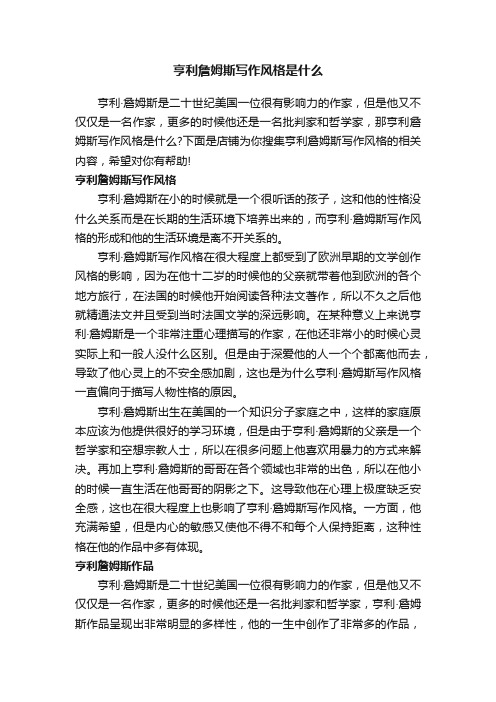
亨利詹姆斯写作风格是什么亨利·詹姆斯是二十世纪美国一位很有影响力的作家,但是他又不仅仅是一名作家,更多的时候他还是一名批判家和哲学家,那亨利詹姆斯写作风格是什么?下面是店铺为你搜集亨利詹姆斯写作风格的相关内容,希望对你有帮助!亨利詹姆斯写作风格亨利·詹姆斯在小的时候就是一个很听话的孩子,这和他的性格没什么关系而是在长期的生活环境下培养出来的,而亨利·詹姆斯写作风格的形成和他的生活环境是离不开关系的。
亨利·詹姆斯写作风格在很大程度上都受到了欧洲早期的文学创作风格的影响,因为在他十二岁的时候他的父亲就带着他到欧洲的各个地方旅行,在法国的时候他开始阅读各种法文著作,所以不久之后他就精通法文并且受到当时法国文学的深远影响。
在某种意义上来说亨利·詹姆斯是一个非常注重心理描写的作家,在他还非常小的时候心灵实际上和一般人没什么区别。
但是由于深爱他的人一个个都离他而去,导致了他心灵上的不安全感加剧,这也是为什么亨利·詹姆斯写作风格一直偏向于描写人物性格的原因。
亨利·詹姆斯出生在美国的一个知识分子家庭之中,这样的家庭原本应该为他提供很好的学习环境,但是由于亨利·詹姆斯的父亲是一个哲学家和空想宗教人士,所以在很多问题上他喜欢用暴力的方式来解决。
再加上亨利·詹姆斯的哥哥在各个领域也非常的出色,所以在他小的时候一直生活在他哥哥的阴影之下。
这导致他在心理上极度缺乏安全感,这也在很大程度上也影响了亨利·詹姆斯写作风格。
一方面,他充满希望,但是内心的敏感又使他不得不和每个人保持距离,这种性格在他的作品中多有体现。
亨利詹姆斯作品亨利·詹姆斯是二十世纪美国一位很有影响力的作家,但是他又不仅仅是一名作家,更多的时候他还是一名批判家和哲学家,亨利·詹姆斯作品呈现出非常明显的多样性,他的一生中创作了非常多的作品,但是这些作品又不仅仅局限于一个种类,他的作品中有关于戏剧的剧本,有关于文学剧作的评论还有他自己写的散文,所以亨利·詹姆斯的作品有很多。
亨利詹姆斯

我试图像亨利·詹姆斯那样保持冷静……他是一位伟大的作家。——海明威
他(亨利·詹姆斯)在小说史上的地位,就和莎士比亚在诗歌史上的地位一样稳固。——格雷厄姆·格林
亨利·詹姆斯在新批评派中占有举足轻重的地位,被喻为“文学大师”、西方现代小说的先驱。詹姆斯提出的“意识中心论”对后来的“意识流小说”影响巨大。中篇小说是詹姆斯偏爱的一种“优美无比的”艺术形式。他认为把丰富多彩的内容纳入少而精的形式,这是对作家的一种挑战。
《卡萨玛西玛公主》The Princess Casamassima (1886)
《阿斯彭文稿》The Aspern Papers (1888)(中篇小说)
《悲惨的缪斯》The Tragic Muse (1890)
《盖伊·汤姆威尔》Guy Domville (1895)(剧本)
《被凌辱的伯顿》 The Spoils of Poynton (1897)
《梅奇知道什么》(What Maisie Knew),美国电影,斯科特·迈克吉 、 大卫·西格尔执导。影片根据19世纪末期问世的同名小说改编而成,但将故事背景设定在了现代的纽约,以十岁小女孩梅奇(Maisie)的视点展开故事情节,这位小姑娘因为父母的离异而深感苦恼。
内容简介:苏珊娜是一个莽撞但是具有魅力的摇滚歌星,她嫁给了比尔,一个总是会心烦意乱的艺术品商人。可是,在中年危机以及外界的诱惑下,这对夫妻终于分手了。梅奇是他们唯一的孩子,成为这对离婚的男女互相牵制,不让对方走进新生活的工具。早慧的梅茜慢慢开始明白,她自私、自利、不负责任的父母是如何丑陋。可是,随着自己父母新家庭的渐渐建立,梅茜也要开始为自己在两个新家里寻找到一个合适的位置……
《梅茜所知道的》What Maisie Knew (1897)
在亨利·詹姆斯的指引下,文学探索变得如此轻松而富有乐趣
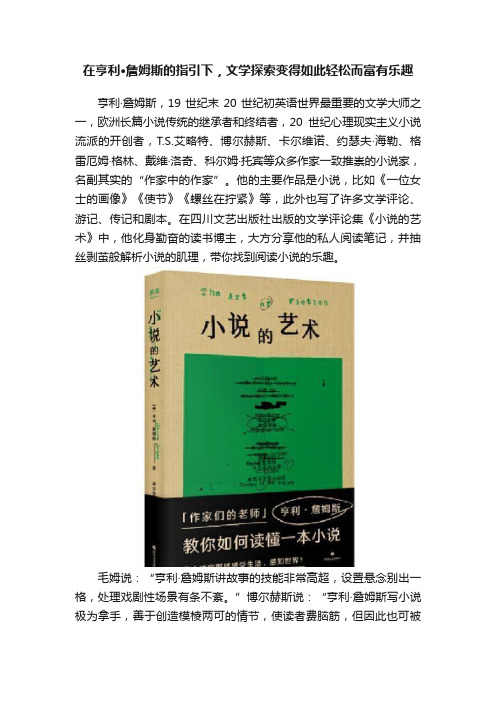
在亨利·詹姆斯的指引下,文学探索变得如此轻松而富有乐趣亨利·詹姆斯,19世纪末20世纪初英语世界最重要的文学大师之一,欧洲长篇小说传统的继承者和终结者,20世纪心理现实主义小说流派的开创者,T.S.艾略特、博尔赫斯、卡尔维诺、约瑟夫·海勒、格雷厄姆·格林、戴维·洛奇、科尔姆·托宾等众多作家一致推崇的小说家,名副其实的“作家中的作家”。
他的主要作品是小说,比如《一位女士的画像》《使节》《螺丝在拧紧》等,此外也写了许多文学评论、游记、传记和剧本。
在四川文艺出版社出版的文学评论集《小说的艺术》中,他化身勤奋的读书博主,大方分享他的私人阅读笔记,并抽丝剥茧般解析小说的肌理,带你找到阅读小说的乐趣。
毛姆说:“亨利·詹姆斯讲故事的技能非常高超,设置悬念别出一格,处理戏剧性场景有条不紊。
”博尔赫斯说:“亨利·詹姆斯写小说极为拿手,善于创造模棱两可的情节,使读者费脑筋,但因此也可被永无休止地读下去。
他的那些丰富的作品,写出来就是为了要人慢慢回味、细细分析的。
”格雷厄姆·格林说:“亨利·詹姆斯在小说史上的地位,就和莎士比亚在诗歌史上的地位一样稳固。
”作为一位卷帙浩繁的小说家及见地深刻的评论家,亨利·詹姆斯在美国现代文学历史上享有独特的地位。
虽然出生于美国,詹姆斯人生中有相当长的时间是在欧洲度过的。
他在青少年时代就多次去过欧洲,不仅如此,由于从小学习法语,他还阅读了大量的英法文学作品,这使得他相较于同时代的欧美作家显得视野更加宽广。
当人们谈到英美小说批评的形式主义传统,必定谈及詹姆斯,因为他的文学批评理论为小说批评的形式主义传统奠定了主要的技术术语和研究方向,尤其是他的论文《小说的艺术》更被视为现代主义文学的一个宣言。
它集中体现了詹姆斯的小说理念:不仅是他作为一名作家对小说创作方法的探索,也是他作为文学批评家关于小说的本质、特点、评估与创作等所作的理论探究。
亨利·詹姆斯的心理现实主义小说及其影响

亨利·詹姆斯的心理现实主义小说及其影响亨利·詹姆斯(Henry James,1843年-1916年)被誉为美国心理现实主义小说的奠基者,他的作品以人物的心理描写和细致入微的社会观察而著称,对于后世文学进步产生了深遥的影响。
他的小说不仅呈现了一种细腻而精确的心理描写,也揭示了人性的复杂性和社会的变化。
本文将以《昔日的遗物》和《转轮》为例,探讨詹姆斯的心理现实主义小说以及其对文学界的影响。
詹姆斯的小说以心理描写为主,通过对人物心里世界的深度探究来呈现作品真实的情感和思想。
在《昔日的遗物》中,他通过对主人公斯特瑞斯更斯先生的思想感情和一系列行动的描写,机灵地刻画出一个往事缠身、心里挣扎的角色形象。
小说以第一人称叙述方式,真实还原了主人公心里世界的复杂性和痛苦。
詹姆斯通过细腻入微的心理描写,展示了人物内在的冲突冲突和情感纠葛。
这种深度剖析人性的手法,使读者更容易投入到故事中,与小说人物产生共情。
在《转轮》中,詹姆斯接受了拟人化的叙事方法,将传统的小说叙述者设定为一个具有自我意识和思维能力的角色。
通过奇特的叙述视角,作者深度剖析了主人公的心里世界和思维过程,以此揭示人物的动态变化和情感进步。
小说盘绕女主人公卡罗琳娜的角色展开,通过她的眼睛和心灵来观察社会现象和人物干系的变化。
这种奇特的叙事手法,使读者更加贴近故事情节,并专注观察和沉思人物的情感变迁。
通过这些小说,詹姆斯不仅在文学上开创了新的叙述方式和心理描写的方法,也对后世文学创作者产生了深遥的影响。
起首,他以心理描写为主线,强调人物心里的思想、情感和动机,从而使小说具有更加深度的人物描写和细致入微的情感表达。
这种心理描写的方法被后来的作家所进修和仿效,并成为现代文学创作的重要手法之一。
其次,詹姆斯对社会现象和人际干系进行了深度观察和剖析,揭示了人性的复杂性和社会的变化。
他的小说不仅是个人心里的呈现,也是对社会普遍现象的批判和反思。
这种对社会现实的关注和剖析的方法,使他的作品具有更广泛的意义和启示,引起了读者对社会问题的关注和沉思。
亨利·詹姆斯的《本亚明·富兰克林》:文学与艺术的追求
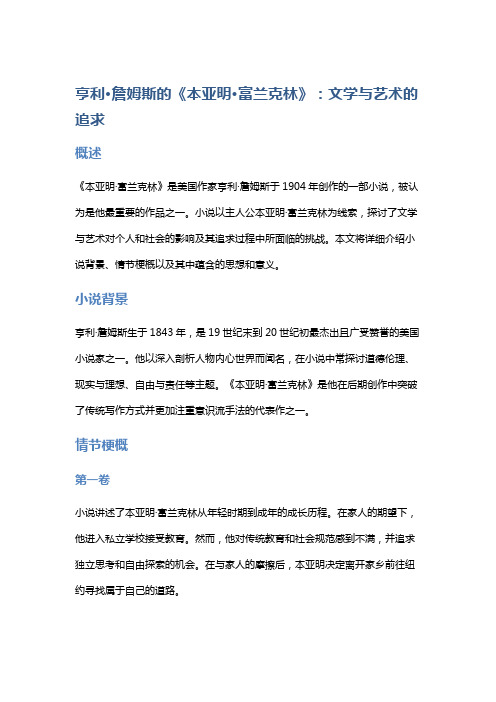
亨利·詹姆斯的《本亚明·富兰克林》:文学与艺术的追求概述《本亚明·富兰克林》是美国作家亨利·詹姆斯于1904年创作的一部小说,被认为是他最重要的作品之一。
小说以主人公本亚明·富兰克林为线索,探讨了文学与艺术对个人和社会的影响及其追求过程中所面临的挑战。
本文将详细介绍小说背景、情节梗概以及其中蕴含的思想和意义。
小说背景亨利·詹姆斯生于1843年,是19世纪末到20世纪初最杰出且广受赞誉的美国小说家之一。
他以深入剖析人物内心世界而闻名,在小说中常探讨道德伦理、现实与理想、自由与责任等主题。
《本亚明·富兰克林》是他在后期创作中突破了传统写作方式并更加注重意识流手法的代表作之一。
情节梗概第一卷小说讲述了本亚明·富兰克林从年轻时期到成年的成长历程。
在家人的期望下,他进入私立学校接受教育。
然而,他对传统教育和社会规范感到不满,并追求独立思考和自由探索的机会。
在与家人的摩擦后,本亚明决定离开家乡前往纽约寻找属于自己的道路。
第二卷本亚明来到纽约后,开始接触艺术和文学界,并结识了一些知名作家和艺术家。
他深受他们的影响,对文学和艺术情有独钟,并展现出了非凡的才华。
然而,他渴望通过自己的创作表达内心世界,面临着探索个人风格和声音、突破传统限制以及获得认可等挑战。
第三卷本亚明逐渐获得成功并成为备受赞誉的文学家。
尽管如此,他仍然质疑自己是否已经达到了真正意义上的艺术追求。
他陷入了内心世界与外部世界之间的紧张关系,同时也面对着个人情感和道德选择的考验。
最终,本亚明决定以崇高的艺术追求作为自己的准则,并为此付出一切努力。
文学与艺术的追求《本亚明·富兰克林》是一部关于文学与艺术的追求的小说,在其中作者探讨了以下问题:1. 艺术与社会规范本亚明在成长过程中对传统教育和社会规范产生了怀疑并追求独立思考和自由探索的机会。
他试图突破约束,通过艺术来表达自己独特的观点和想法。
美国文学课 亨利詹姆斯简介

亨利·詹姆斯亨利·詹姆斯(Henry James,1843年4月15日-1916年2月28日),19世纪美国继霍桑、麦尔维尔之后最伟大的小说家,也是美国乃至世界文学史上的大文豪。
詹姆斯的主要作品是小说,此外也写了许多文学评论、游记、传记和剧本。
他的小说常写美国人和欧洲人之间交往的问题;成人的罪恶如何影响并摧残了纯洁、聪慧的儿童;物质与精神之间的矛盾;艺术家的孤独,作家和艺术家的生活等。
代表作有长篇小说:《一个美国人》、《一位女士的画像》、《鸽翼》、《使节》和《金碗》等。
他的创作对20世纪崛起的现代派及后现代派文学有着非常巨大的影响。
中文名亨利·詹姆斯外文名Henry James国籍美国出生日期1843年4月15日逝世日期1916年2月28日职业文学家主要成就写出大批具有巨大影响力的小说代表作品一个美国人、一位女士的画像、鸽翼、使节、金碗等目录1简介2人物履历3成长经历4创作之路5相关评价6成就7名人评价8主要作品列表1简介编辑亨利·詹姆斯(Henry James,1843年4月15日- 1916年2月28日、享年73岁),英国-美国作家。
他出身于纽约的上层知识分子家庭,父亲老亨利·詹姆斯是著名学者,兄长威廉·詹姆斯是知名的哲学家和心理学家。
詹姆斯本人长期旅居欧洲,对19世纪末美国和欧洲的上层生活有细致入微的观察。
詹姆斯是同性恋者。
他与同时代的美国女作家伊迪丝·华顿保持着长期的友谊。
詹姆斯的主要作品是小说,此外也写了许多文学评论、游记、传记和剧本。
他的小说常写美国人和欧洲人之间交往的问题;成人的罪恶如何影响并摧残了纯洁、聪慧的儿童;物质与精神之间的矛盾;艺术家的孤独,作家和艺术家的生活等:这表明作家对个人道德品质的浓厚兴趣。
詹姆斯著作有长篇小说《一个美国人》、《华盛顿广场》《一位女士的画像》、《鸽翼》、《使节》、《金碗》等。
中短篇小说有《黛西·米勒》、《阿斯彭文稿》、《螺丝在旋紧》、《丛林猛兽》以及一组描写作家、艺术家生活的中短篇小说如《真东西》、《地毯上的图案》等。
亨利詹姆斯

亨利·詹姆斯百科内容来自于:亨利·詹姆斯(HenryJames,1843年4月15日-1916年2月28日),英国以及美国的作家。
亨利·詹姆斯出身于纽约的上层知识分子家庭,父兄都是美国颇具声望的哲学家。
由于家境富裕,亨利·詹姆斯从小受到良好的教育,掌握多种语言。
詹姆斯本人长期旅居欧洲,对19世纪末美国和欧洲的上层生活有细致入微的观察。
詹姆斯是同性恋者。
他与同时代的美国女作家伊迪丝·华顿保持着长期的友谊。
詹姆斯的主要作品是小说,此外也写了许多文学评论、游记、传记和剧本。
他的小说常写美国人和欧洲人之间交往的问题;成人的罪恶如何影响并摧残了纯洁、聪慧的儿童;物质与精神之间的矛盾;艺术家的孤独,作家和艺术家的生活等。
生平简历亨利·詹姆斯作品亨利·詹姆斯1843年4月15日生于纽约;1862年考入哈佛大学法学院;从1864年起开始文学创作;1869年游历了英国、法国和意大利等国后,决定离开美国,移居欧洲;1875~1876年住在巴黎,结识了屠格涅夫、左拉、都德等作家;1878年后迁居伦敦;1879年中篇小说《黛西·密勒》使他一举成名;1881年出版的《一位女士的画像》,是他早期创作中最具代表意义的作品;1904~1905年曾回美国;1915年因不满美国在第一次世界大战初期的“中立”态度而加入英国籍;成长经历亨利·詹姆斯詹姆斯出身于纽约一个有钱的知识分子家庭。
父亲是个哲学家、神学家,但为人专横粗暴。
长兄威廉健壮得如同运动员一般,后来成了令人敬畏的哲学家和哈佛大学心理学教授。
詹姆斯的童年非常不愉快,他是在对哥哥的畏惧中成长起来的。
詹姆斯曾经跟家庭闹翻过,不过后来又修补了这种关系。
他在哥哥阴影笼罩下的成长,是怎样影响到他的内心世界,并进而影响到他的创作的,因为詹姆斯生性过于敏感。
笑声很少来自于詹姆斯,由于跟他友好的人过早去世,包括他的姐姐艾丽丝,他的表妹米妮·坦普尔,他活得一直很沉重。
Part 4 Henry James 亨利 詹姆斯
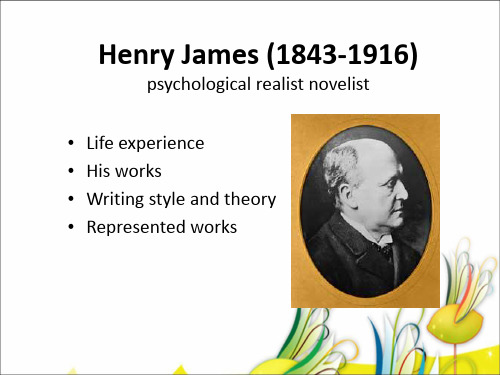
• In 1875 he decided that Europe was his ideal home and settled in Paris, where he met Flaubert and Maupassant. • Then in 1915 he went to England and became British subject, where he met the most well-known writers of the period, such as Conrad and Kipling, accepted him as a friend and appreciated his books. 1875年,他在法国巴黎定居,并相识了福楼拜和莫泊 桑。 1915年,亨利詹姆斯成了一个英国公民。
• 詹姆斯是以其”国际主题“小说家闻名于世的。 他的主要小说几乎全是以一个在欧洲的美国人为 中心人物的。通过这个人物作者使美国人的积极 主动与欧洲贵族的矫揉造作,美国人的天真纯朴 与欧洲人的老奸巨猾形成了鲜明的对比。一般说 来,作者以美国人的优点对欧洲人的缺点——以 美国人的纯洁、实际、主动、真挚、活跃、自然 和忠诚等对欧洲人(包括久住欧洲的美国人)的 老于世故、拘泥形式、礼仪、文雅、艺术、虚伪 和邪恶等等。
the reasons for being popular:
• • • • i. international theme, he penetrated it so deeply ii. refined language 精细的语言 iii. psychological realism 心理分析现实主义 a pioneer showing inner consciousness of his characters in face of outward happiness 展示内心的意识—先驱者 • 1st modern psychological analyst 现代心理分析大师
美国文学课亨利詹姆斯简介

中文名亨利·詹姆斯外文名国籍美国出生日期年月日逝世日期年月日职业文学家主要成就写出大批具有巨大影响力地小说代表作品一个美国人、一位女士地画像、鸽翼、使节、金碗等目录简介文档来自于网络搜索
人物履历
成长经历
创作之路
相关评价
成就
名人评价
主要作品列表
简介编辑亨利·詹姆斯(年月日年月日、享年岁),英国美国作家.他出身于纽约地上层知识分子家庭,父亲老亨利·詹姆斯是著名学者,兄长威廉·詹姆斯是知名地哲学家和心理学家.詹姆斯本人长期旅居欧洲,对世纪末美国和欧洲地上层生活有细致入微地观察.詹姆斯是同性恋者.他与同时代地美国女作家伊迪丝·华顿保持着长期地友谊.詹姆斯地主要作品是小说,此外也写了许多文学评论、游记、传记和剧本.他地小说常写美国人和欧洲人之间交往地问题;成人地罪恶如何影响并摧残了纯洁、聪慧地儿童;物质与精神之间地矛盾;艺术家地孤独,作家和艺术家地生活等:这表明作家对个人道德品质地浓厚兴趣.文档来自于网络搜索
詹姆斯著作有长篇小说《一个美国人》、《华盛顿广场》《一位女士地画像》、《鸽翼》、《使节》、《金碗》等.中短篇小说有《黛西·米勒》、《阿斯彭文稿》、《螺丝在旋紧》、《丛林猛兽》以及一组描写作家、艺术家生活地中短篇小说如《真东西》、《地毯上地图案》等.詹姆斯写了许多很有见地地评论文章,涉及英、美、法等国作家,如乔治·艾略特、斯蒂文森、安东尼·特罗洛普、霍桑、爱默生、巴尔扎克、乔治·桑、福楼拜以及屠格涅夫等.有自传三种行世:《童年及其他》、《作为儿子与兄弟》和《中年》.[]文档来自于网络搜索
亨利 詹姆斯

亨利.詹姆斯小说创作的主要内容
• 詹姆斯著作有长篇小说《一个美国人》、《贵妇 的画像》(也就是书上的《一位女士的画像》) 等。中短篇小说有《黛西· 米勒》、《螺丝在旋 紧》、《丛林猛兽》以及一组描写作家、艺术家 生活的中短篇小说。詹姆斯写了许多很有见地的 评论文章,涉及英、美、法等国作家,如乔治· 艾 略特、斯蒂文森、安东尼· 特罗洛普、霍桑、爱默 生、巴尔扎克、乔治· 桑以及屠格涅夫等。有自传 三种行世:《童年及其他》、《作为儿子与兄弟》 和《中年》。
亨利.詹姆斯小说创作的主要内容
• 詹姆斯的主要作品是小说,此外也写了许多文学 评论、游记、传记和剧本。他的小说常写美国人 和欧洲人之间交往的问题;成人的罪恶如何影响 并摧残了纯洁、聪慧的儿童;物质与精神之间的 矛盾;艺术家的孤独,作家和艺术家的生活等: 这表明作家对个人道德品质的浓厚兴趣。这是深 有文化教养的知识分子所怀有的人文主义倾向, 而不是人们所熟悉的对贫苦大众的人道主义同情。 作者赞美优美而淳厚的品德,把个人品质高高置 于物质利益甚至文化教养之上,个人品质和他人 利益高于一切。
• 英国批评家史本德这样评价詹姆斯:“他来自一个年 轻的国家,所以对于一般头脑崭新思想丰富的人在 政治或买卖上的冒险精神不大会感到兴趣;他对于 无家可归的流浪汉的悲惨景况也大抵无动于衷。 贫穷潦倒和奋斗进取只是舞台的背景,他却完全被 台上的辉煌华丽的布景和戏剧性的人物所吸引 了。”也就是说,詹姆斯的家庭背景和交往使他对 上层家庭和知识分子有着深刻的了解,因此他的小 说里的人物大多选择这个阶层;同时,他常来往于欧 美两地,不知不觉中时常拿欧洲的古老文化和美国 的新异文化来做对比,这使他的人物在不同的文化 背景中有了新的姿态和意义。
• 在亨利· 詹姆斯的早期作品中,强调的也是客 观地反映生活,强调的是真实。 • 那么真实来自何处?
Henry james(亨利·詹姆斯)

精选版课件ppt
The American, however, usually have a morality and innocence which the Europeans lack. James seemed to value both the sophistication of Europe and the idealism of America
精选版课件ppt
14
Second period
精选版课件ppt
15
Third period(major period)
return to international theme
精选版课件ppt
16
International theme
a story which brings together persons of various nationalities who represent certain characteristics of their countries. The Europeans in James' novels are more cultured, more concerned with art, and more aware of the subtleties of social situations than James'
In 1976,
his ashes were removed to Poet’s corner
in Westminster Abbey
精选版课件ppt
8
Henry James
(1843-1916)
the founder of psychological realism
亨利·詹姆斯鬼故事中的多元现实的开题报告
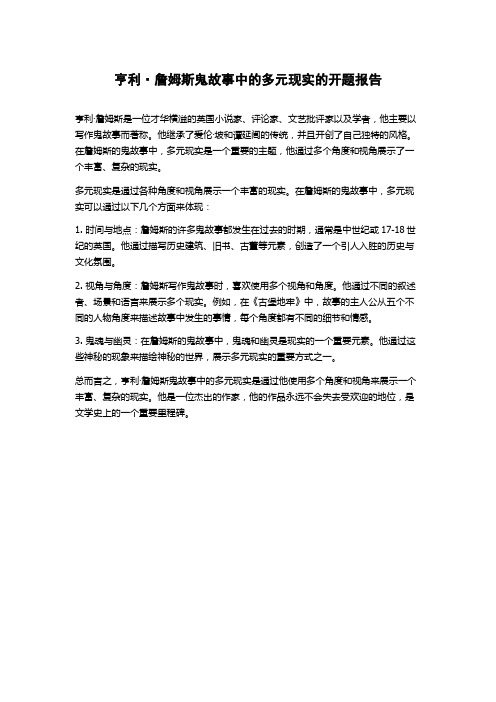
亨利·詹姆斯鬼故事中的多元现实的开题报告
亨利·詹姆斯是一位才华横溢的英国小说家、评论家、文艺批评家以及学者,他主要以写作鬼故事而著称。
他继承了爱伦·坡和谭延闿的传统,并且开创了自己独特的风格。
在詹姆斯的鬼故事中,多元现实是一个重要的主题,他通过多个角度和视角展示了一个丰富、复杂的现实。
多元现实是通过各种角度和视角展示一个丰富的现实。
在詹姆斯的鬼故事中,多元现实可以通过以下几个方面来体现:
1. 时间与地点:詹姆斯的许多鬼故事都发生在过去的时期,通常是中世纪或17-18世纪的英国。
他通过描写历史建筑、旧书、古董等元素,创造了一个引人入胜的历史与文化氛围。
2. 视角与角度:詹姆斯写作鬼故事时,喜欢使用多个视角和角度。
他通过不同的叙述者、场景和语言来展示多个现实。
例如,在《古堡地牢》中,故事的主人公从五个不同的人物角度来描述故事中发生的事情,每个角度都有不同的细节和情感。
3. 鬼魂与幽灵:在詹姆斯的鬼故事中,鬼魂和幽灵是现实的一个重要元素。
他通过这些神秘的现象来描绘神秘的世界,展示多元现实的重要方式之一。
总而言之,亨利·詹姆斯鬼故事中的多元现实是通过他使用多个角度和视角来展示一个丰富、复杂的现实。
他是一位杰出的作家,他的作品永远不会失去受欢迎的地位,是文学史上的一个重要里程碑。
- 1、下载文档前请自行甄别文档内容的完整性,平台不提供额外的编辑、内容补充、找答案等附加服务。
- 2、"仅部分预览"的文档,不可在线预览部分如存在完整性等问题,可反馈申请退款(可完整预览的文档不适用该条件!)。
- 3、如文档侵犯您的权益,请联系客服反馈,我们会尽快为您处理(人工客服工作时间:9:00-18:30)。
1.life introduction
novelist, literary critic, playwright and essayist Born into a wealthy family;Brother: William James (pragmatist philosopher and psychologist);unmarried Influence by English, European and American writer:Balzac, Zola, Ibsen,George Eliot, Flaubert, Trugenev and Hawthorne
distinctive periods:
①1865-1881: international theme ②1882-1895: tales of inter-personal relationships ③1895-1916: A. till 1900: a few novellas and tales dealing with childhood and adolescence, which was a revival of his earlier theme of innocence in a corrupted world
B. 1901-1904: “the major phase” of his career (summit of his art): the accomplishment of the trilogy, in which he returned to his old “the international theme” (the differences between the New World and the Old; personal freedom; moral responsibility; betrayal; sexuality ) C. till death: some American impressions and autobiographical matter, two unfinished novels
His protagonists were often young American women facing oppression or abuse. His plots often centered on the clash of personalities and cultures in stories of personal relationships, and other moral questions.
On the other hand: “It is art that makes life, makes interest, makes importance.” In his opinion, writers should use art to bring pattern and meaning out of life.
Marriage and love are used by James as the focal point of the confrontation between the two value systems, and the protagonist usually goes through a painful process of a spiritual growth, gaining knowledge of good and evil from the conflict.
The typical pattern of the international theme: A young American man or an American girl who goes to Europe and affronts his or her destiny. The unsophisticated boy or girl would be beguiled, betrayed, cruelly wronged at the hands of those who pretend to stand for the highest possible civilization.
2.political-social ideas and attitudes:
①A spokesman of the wealthy, deep-rooted leisure class, stressing travel, cosmopolitanism,大同主义,四海一家 manners, and taste as indices ['ɪndɪsiːz] 符号to social superiority ② conservative toward overzealous reformers ③ critical of U.S. imperialist [ɪm'pɪriəlɪst]帝 国主义 behavior
4. literary criticism
His literary criticism is both concerned with form and devoted to human values. “The Art of Fiction” 1884 On one hand: “art without life is a poor affair”: the aim of the novel is to represent life, the air of reality is the supreme virtue of a novel, so he advocates an immense increase of freedom in novel-writing and argues for inclusion of the disagreeable, the ugly and the commonplace.
Байду номын сангаас
④ expose predatory business competition of the New World and its dehumanizing result, and the decadence and corruption of the Old ⑤critical of American life, its obsession with “business,” it extremes of wealth and poverty, its lack of culture and sophistication
felt the materialistic bent of American life and its lack of culture and sophistication intolerable; an admirer of European manners London, 1876 → a naturalized British citizen in 1915: an expatriate (an American-born British author); in 1916, receive the Order of Merit from King George V
3. Major Works
The Jolly Corner Daisy Miller 1878 (international fame) The Turn of the Screw 1898(a gothic story) The Portrait of a Lady 1881
the trilogy
5.Daisy Miller ①story ②Daisy ③Theme
1. he cares about the upper class 2.international theme 3.psychological realism nguage: difficult ,obscure
⑥regard evil as essentially of inward cause and cure, advocate free-willed renunciation of the low or mean, and repeatedly emphasized magnanimity and the beauty of goodness
The Wings of the Dove 1902 The Golden Bowl 1904 Celebrate the innocence, loyalty and generosity of Americans; the victory of American morality over the European corruption The Ambassadors the victory of European highly-educated over the American Utilitarianism
The settings of his fiction range from working class to aristocratic, and often describe the efforts of middle-class Americans to make their way in European capitals. His method of writing from the point of view of a character within a tale allowed him to explore the phenomena of consciousness and perception.
